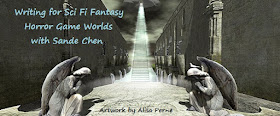Hi! We're now in the second week of the longer PlayCrafting NYC course, Game Writing Primer, and I am looking forward to playing all the story-based games produced in the course. Since it's been a while since the last Writing For Sci-Fi, Fantasy & Horror Game Worlds, I'd thought it would be fun to do this workshop again.
If you're interested in science fiction, fantasy, and/or horror and want to populate your game world with monsters, creatures, aliens, fantastical beasts, and otherworldly cultures, you can benefit from this participatory workshop. Tickets sold here.
As always, Playcrafting NYC, which offers classes and events related to game development, has Early Bird tickets, but if they sell out (and they have in the past), you'll have to pay full price.
Come and write!
Date: Monday, May 1, 2017
Time: 6:30 PM - 8:30 PM
Place: Microsoft NY, 11 Times Square
About Me
My background is a mixture of theatre, film, journalism, economics, and writing. I received a S.B. in Writing and Humanistic Studies (now the major of Comparative Media Studies) at MIT and then I specialized in Screenwriting at USC's School of Cinematic Arts. My first published game as a writer was on the epic space combat RPG, Terminus, which won 2 awards at the 1999 Independent Games Festival. Afterwards, I worked on the episodic fantasy series Siege of Avalon, MMO Wizard101, and the dark fantasy RPG, The Witcher, for which I was nominated for a Writers Guild of America Award in Videogame Writing. I am a founding member of the IGDA Game Design SIG.


